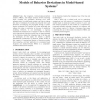Free Online Productivity Tools
i2Speak
i2Symbol
i2OCR
iTex2Img
iWeb2Print
iWeb2Shot
i2Type
iPdf2Split
iPdf2Merge
i2Bopomofo
i2Arabic
i2Style
i2Image
i2PDF
iLatex2Rtf
Sci2ools
117
click to vote
ECAI
2004
Springer
2004
Springer
Models of Behavior Deviations in Model-Based Systems
Tasks like diagnosis, failure-modes-and-effects analysis (FMEA), and therapy proposal involve reasoning about variables and parameters deviating from some reference state. In model-based systems, one tries to capture this kind of inferences by models that describe how such deviations are emerging and propagated through a system. Several techniques and systems have been developed that address this issue, in particular in the area of qualitative modeling. However, to our knowledge, a rigorous mathematical foundation and a “recipe” for how to construct such compositional deviation models has not been presented in the literature, despite the widespread use of the idea and the techniques. In this paper, we present a general mathematical formalization of deviation models. Based on this, aspects of constructing libraries of deviation models, their properties, and their application in consistency-based diagnosis and prediction-based FMEA in a componentoriented framework are analyzed.
Artificial Intelligence | Compositional Deviation Models | Deviation Models | ECAI 2004 | Rigorous Mathematical Foundation |
Related Content
| Added | 01 Jul 2010 |
| Updated | 01 Jul 2010 |
| Type | Conference |
| Year | 2004 |
| Where | ECAI |
| Authors | Peter Struss |
Comments (0)

